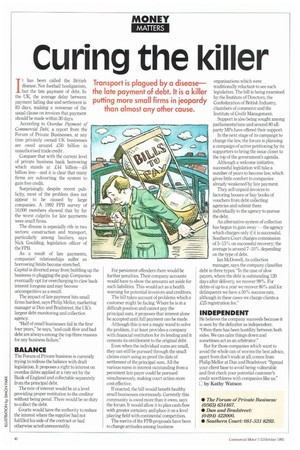Curing the killer
Page 48

If you've noticed an error in this article please click here to report it so we can fix it.
It has been called the British disease. Not football hooliganism, but the late payment of debt. In the UK, the average delay between payment falling due and settlement is 83 days, making a nonsense of the usual clause on invoices that payment should be made within 30 days.
According to Overdue Payment of Commercial Debt, a report from the Forum of Private Businesses, at any time privately owned UK businesses are owed around £50 billion in unauthorised trade credit.
Compare that with the current level of private business bank borrowing which stands at .£44 billion—.0 billion less—and it is clear that many firms are subverting the system to gain free credit.
Surprisingly, despite recent publicity, most of the problem does not appear to be caused by large companies. A 1992 FPB survey of 10,000 members showed that by far the worst culprits for late payments were small firms.
The disease is especially rife in two sectors: construction and transport, particularly among hauliers, says Nick Goulding legislation officer of the FPB.
As a result of late payments, companies' relationships suffer as borrowing limits become stretched. Capital is diverted away from building up the business to plugging the gap. Companies eventually opt for overcharging to claw back interest foregone and may become uncompetitive as a result.
The impact of late payment hits small firms hardest, says Philip Mellor, marketing manager at Dun and Bradstreet, the UK's largest debt monitoring and collection agency.
"Half of small businesses fail in the first four years," he says, "and cash flow and bad debt are always among the top three reasons for any business failure."
BALANCE
The Forum of Private business is currently trying to redress the balance with draft legislation. It proposes a right to interest on overdue debts applied at a rate set by the Bank of England and collectable separately from the principal debt.
The rate of interest would be at a level providing proper restitution to the creditor without being penal. There would be no duty to collect the debt.
Courts would have the authority to reduce the interest where the supplier had not fulfilled his side of the contract or had otherwise acted unreasonably. For persistent offenders there would be further penalties. Their company accounts would have to show the amounts set aside for such liabilities. This would act as a health warning for potential investors and creditors.
The bill takes account of problems which a customer might be facing. Where he is in a difficult position and cannot pay the principal sum, it proposes that interest alone be accepted until full payment can be made.
Although this is not a magic wand to solve the problem, it at least provides a company with financial restitution for its lending and it cements its entitlement to the original debt.
Even when the individual sums are small, they can still be pursued through the small claims court using as proof the date of settlement of the principal sum. All the various sums in interest outstanding from a persistent late payer could be pursued simultaneously, making court action more cost-effective.
If enacted, the bill would benefit healthy small businesses enormously. Currently this community is owed more than it owes, says the forum. It would allow it to plan cash flow with greater certainty and place it on a level playing field with continental competition.
The merits of the FPB proposals have been to change attitudes among business organisations which were traditionally reluctant to see such legislation. The bill is being examined by the Institute of Directors, the Confederation of British Industry, chambers of commerce and the Institute of Credit Management.
Support is also being sought among parliamentarians and around 80 allparty MPs have offered their support.
In the next stage of its campaign to change the law, the forum is planning a campaign of active petitioning by its supporters to bring the issue closer to the top of the government's agenda.
Although a welcome initiative, successful legislation will take a number of years to become law, which gives little comfort to companies already weakened by late payment.
They sell unpaid invoices to factoring houses or buy books of vouchers from debt collecting agencies and submit them individually to the agency to pursue the debt.
An alternative system of collection has begun to gain sway — the agency which charges only if it is successful. Southern Court charges commission of 5-15% on successful recovery; the average is around 7-10% depending on the type of debt.
Ian McDowell, its collection manager, says the company classifies debt in three types: "In the case of slow payers, where the debt is outstanding 120 days after delivery, we recover 99%. For debts of up to a year we recover 80% and for delinquents we have a 50% success rate, although in these cases we charge clients a £25 registration fee."
INDEPENDENT
He believes the company succeeds because it is seen by the defaulter as independent. "Often there has been hostility between both sides. We can calm things down and sometimes act as an arbitrator."
But for those companies which want to avoid the whole can of worms the best advice, apart from don't trade at all, comes from Philip Mellor at Dun and Bradstreet: "Spread your client base to avoid being vulnerable and first check your potential customer's credit worthiness with companies like us." 0 by Kathy Watson




























































































